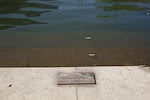A Clackamas County judge ordered the City of Lake Oswego on Monday to end its exclusionary lake use policies and allow public access.
Clackamas County Circuit Court Judge Kathie Steele ordered the city to remove all “boulders, metal reeds, and any other obstructions to public access to Oswego Lake from Millennium Plaza Park.” It also requires the city to remove any exclusionary signage that says “Private Lake” or “No Trespassing.”

Small metal signs adorn steps leading down to Oswego Lake's shore in a public park read: “Private Lake – Please stay on the steps.” Access to Oswego Lake is restricted to city residents only.
Conrad Wilson / OPB
However, the order allowed the city to continue to prohibit public access to the lake from two other locations — Sundeleaf Plaza and Headlee Walkway.
It’s the latest involving a case over access to Oswego Lake, which has stretched on for more than a decade. In 2012, kayaker Mark Kramer and open-water swimmer Todd Prager sued the city over its rules.
Access has long been restricted to members of the Lake Oswego Corporation, a group primarily made up of people who own the property and opulent homes surrounding the water. City residents could access a seasonal swim park, but the general public was not allowed to enter Oswego Lake to swim, fish or boat.
Last fall, Steele effectively ended that practice, saying the city can set limits, but cannot restrict access.
“Life changes,” the judge wrote in her November ruling. “Banning the public outright is unreasonable.”
This latest order gives the city four months to remove any physical barriers to the lake, and one month to take down signage limiting access. The city is also prohibited from erecting any other barriers “designed to prevent or discourage the exercise by the public of the right to reasonable access and use” of the lake from Millennium Park Plaza.
In a statement Monday, the Lake Oswego Corporation said Steele’s ruling is an “oversimplified judgment that purports to allow public access to the Lake from Millennium Plaza Park only, but does not give the City adequate time or direction to create safe and compliant access.”
The City of Lake Oswego said in a statement that they would take a “deliberate and thoughtful approach in assessing next steps” and would have more information in the next 30 days.
Editor’s note: This story has been updated to include a statement from the City of Lake Oswego.


